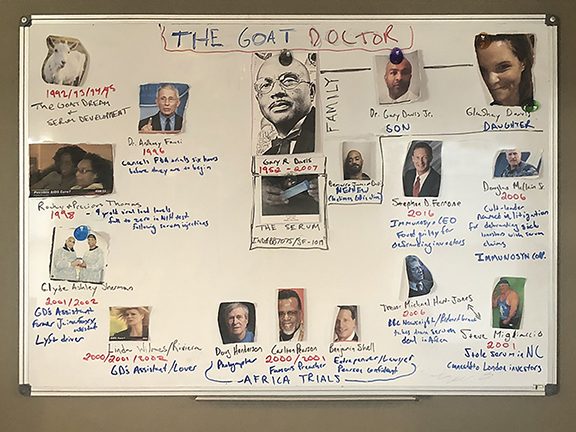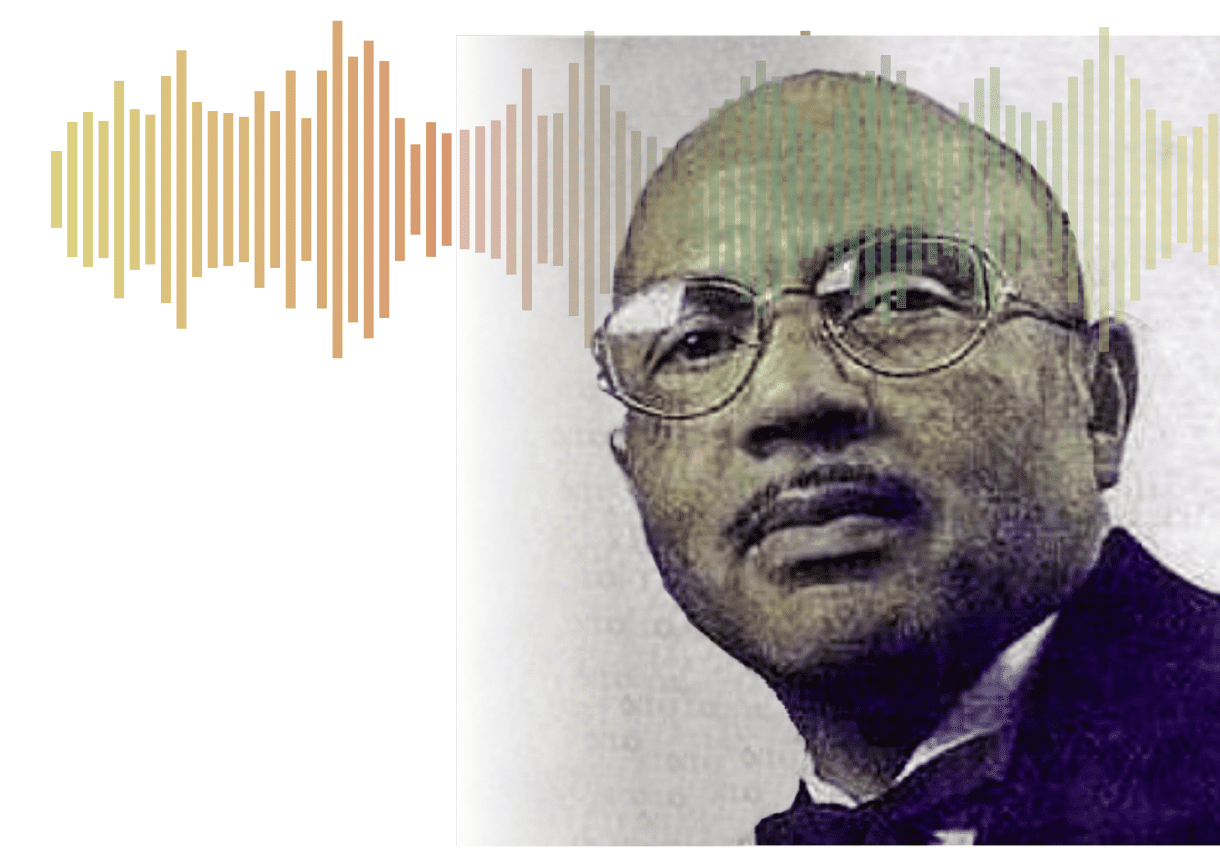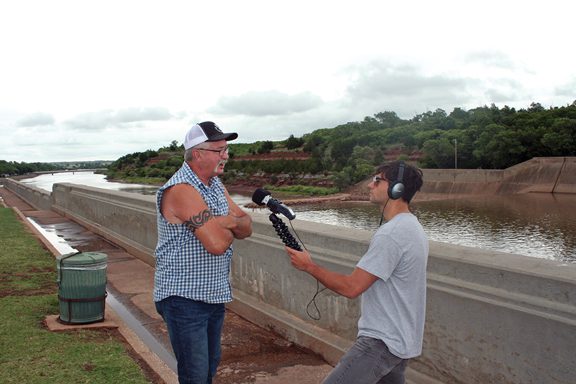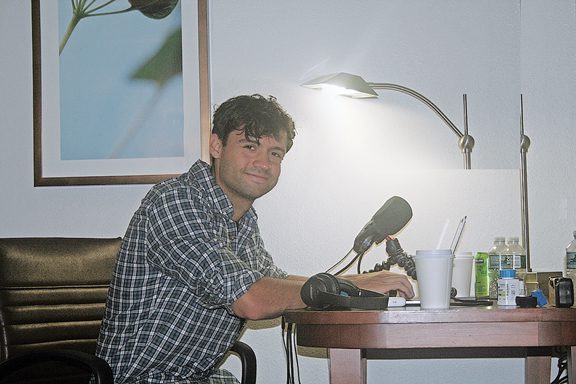One very late night, a WHYY intern (and Rutgers law student) stumbled upon the incredible story of a doctor who claimed his “goat serum” was the cure for AIDS. It had mind-blowing twists and turns, and outlandish characters and claims. It was a story the young journalist knew he had to follow.

The first time Grant Hill heard the story of the doctor, the goats and the cure for AIDS – the story that would become his hit podcast “Serum” – he was drunk.
“I had a kind of late night out in Philly,” says Hill, “so I called a Lyft.” The driver, a man named Clyde Ashley Sherman, was in the mood to chat. “He told me about his past in Hollywood, and all these unbelievable tales of celebrities he used to meet, and then he asked me what I did,” Hill says. “I said I was a journalist.”
That’s when Sherman launched into a totally different tale: one about his years working as an assistant to a doctor from Tulsa, Oklahoma who, as Sherman put it, “cured AIDS.”
Hill mostly humored Sherman in that first conversation. After all, most of what the Lyft driver said sounded completely ridiculous. But the journalist couldn’t help himself. He kept asking questions. “The Lyft ride was supposed to take like 10 minutes,” Hill says. “It ended up being like 43. I was fascinated, even though I believed there was a 2 percent chance any of what he was telling me was true.”
But Hill was hooked. He spent the next few years chasing down leads, conducting interviews, taking trips to Oklahoma and Washington, DC, and following a story that spans at least 4 continents and 40 years. Last year, it all came together in “Serum,” a podcast produced by WHYY. Across 9 episodes, Hill, an intern-turned-reporter at WHYY and a law student at Rutgers-New Brunswick, explores the story of Dr. Gary Davis.
 The broad strokes go a little like this: In the 1990s, Davis, a well-respected African American doctor and Navy veteran, had a dream. In it, he saw himself drawing the blood of a goat and creating an antivenom-like treatment that would counteract the AIDS virus. At the time, AIDS was sweeping through the United States and hitting Black communities like Tulsa’s especially hard. If Davis’ serum really did offer a cure, it would have been heralded as a miracle.
The broad strokes go a little like this: In the 1990s, Davis, a well-respected African American doctor and Navy veteran, had a dream. In it, he saw himself drawing the blood of a goat and creating an antivenom-like treatment that would counteract the AIDS virus. At the time, AIDS was sweeping through the United States and hitting Black communities like Tulsa’s especially hard. If Davis’ serum really did offer a cure, it would have been heralded as a miracle.
Davis did eventually create the serum – and even tested it on some people – but it was never subjected to a study by the FDA or any other official body. There were rumors about its efficacy, but little proof. It wasn’t clear whether Davis was a medical genius ahead of his time, or a man plagued by paranoia and obsession.
The rest of Davis’ story, however, remained a mystery. The doctor had died unexpectedly, leaving his “cure” largely untested. But the more Hill learned, the more it seemed plausible that the serum might actually work.
“I think that for so long, proponents of Davis were always asking officials, ‘Why will you not at least take a look at this?’ Why won’t federal health officials take this seriously?” Maybe it was because of the whole goat thing. But then again, Hill says, “penicillin was moldy bread. Like, it all sounds ridiculous until it’s right.”
What he knew for sure was that Davis was a character, and he wanted to find out everything he could about the late doctor.
“Here’s this guy who has all the credentials,” Hill says. “I mean, he was a captain in the U.S. Navy, and a medical officer for the Navy. He worked at the National Naval Medical Center for years. He went to Dartmouth Medical School, he worked at Dow Chemical. I mean, he was a brilliant, brilliant man who overcame so much to do all those things, especially living in Tulsa and growing up in the shadow of historic racial violence. In many ways, it’s the story of this country.”

Hill took his first reporting trip to Oklahoma while the pandemic was raging, met with members of Davis’ family, and saw the run-down site of his former office. He also worked on tracking down one very important piece of the puzzle: a girl named Precious Thomas. She’d been diagnosed with HIV as a child, and her adoptive mother claimed that Davis’ goat serum had worked to cure the child.
Eventually, Hill would find and interview Precious – though she now goes by a different name – and her adoptive mother. He also interviewed a photographer, another test subject, a retired professional basketball player, and many, many others. The story gets crazy, and it has everything: cults, gay cowboys, British mobsters, American powerlifters, theft, theories and maybe even the CIA.
“I was fully in it, and it just became this incredible saga,” says Hill. Every time he thought he was coming to the end of the treasure hunt – the person with all the answers – it turned out to be just another fork in the road.
“I got a version of the story from the adoptive mother, and then I got another story from this photographer,” Hill says. “From there, they would mention names of people who were involved with the doctor, and then it would just kind of spread. I’ve spoken to dozens and dozens of people at this point who all have varying degrees of connections to Dr. Davis and have dozens of different takes about exactly what happened. It’s been a fascinating, fascinating journey.”
And for Hill, the journey of creating Serum sometimes still seems like an unlikely one. When the story of Davis and his goat serum first began to unravel, Hill was a new intern at WHYY’s The Pulse, working under host and creative director Maiken Scott.
“At first I didn’t bring it up,” Hill says, “because I thought, I can’t be the intern who comes in with an AIDS cure on the first day.”
Instead, he did some more digging, uncovering information and pulling loose threads. Eventually, Hill says, he was ready to bring it to Scott, who’d become a mentor.
“None of this would have happened without her,” he says. “She’s just as much a part of this series as I am.”
To get Scott on board, Hill knew he’d have to lay out the whole complex story and its cast. “I put everything up on a whiteboard – like a murder board,” he says. “I know it looks crazy. It probably was crazy. But I took a picture of the murder board and brought it to Maiken, and she saw all these characters and was, I think, as hooked as I was. Once she was in, she went all in.”
It wasn’t Hill’s first time making a multi-part audio project. When he was a senior in college, he made a podcast about the police chief in his hometown of Bordentown – “the first chief in America in a decade to be charged with a hate crime,” says Hill. That was a big project, “but it was still on a scale that was much smaller than Serum. This was crazy. And it was very overwhelming. And I still can’t believe it’s come together in the way it has.”
The story of Serum, which is available to stream on all major podcast platforms, has a lot of twists and turns. But in the end – spoiler alert – Hill is left with more questions than answers.
 “I can’t deny that through a lot of this I have rooted for Gary Davis, because his story is so compelling,” Hill says. “One thing I’ve had to really deal with is just how complicated a man he was. And how complicated the story is. And knowing there will always be more questions and the chase will never end.”
“I can’t deny that through a lot of this I have rooted for Gary Davis, because his story is so compelling,” Hill says. “One thing I’ve had to really deal with is just how complicated a man he was. And how complicated the story is. And knowing there will always be more questions and the chase will never end.”
As for his next big story, Hill’s not entirely sure what that’ll be. But he knows how to find it: “I’m just going to start taking a lot of Lyfts.”














